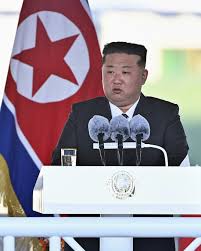US will strike North Korea if South attacked with nukes, South Korea’s spy chief nominee says

South Korea’s nominee for intelligence chief, Lee Jong-seok, made a bold claim on June 19. He said the U.S. will launch a nuclear strike against North Korea if Pyongyang uses nukes on South Korea. The remark highlights the depth of the U.S.–South Korea military alliance and the serious risks in the region.
North Korea’s Missile Provocations
North Korea has continued to test weapons and escalate tensions. It recently launched short-range rockets from areas near Pyongyang. While the regime has nuclear warheads, it hasn’t tested one on a missile in actual conditions. Still, leader Kim Jong-un has warned he could use nukes preemptively. These threats are aimed at both South Korea and U.S. military bases in Asia.
Kim’s shift from deterrence to first-strike posture alarms many. His statements suggest Pyongyang may act without waiting for provocation.
A Clear Message from Seoul
Lee Jong-seok, a respected former unification minister, shared a firm opinion during his hearing. “If North Korea uses nuclear weapons on the South, the U.S. will respond in kind,” he said. He believes the U.S. nuclear umbrella is real and credible.
That umbrella includes a promise to defend South Korea with all U.S. capabilities. This covers both conventional and nuclear weapons. Lee’s confidence reflects recent U.S. actions, including joint drills and increased deployments.
U.S.–South Korea Military Agreement
The 1953 Mutual Defense Treaty between the U.S. and South Korea is still active. It obligates both nations to respond if either is attacked. The treaty has grown over time to cover newer threats, like cyber and space attacks.
The 2023 Washington Declaration further strengthened this alliance. The U.S. agreed to send nuclear-capable submarines and bombers in crisis situations. These steps were meant to assure South Korea and deter North Korea.
Seoul’s Growing Military Strength
South Korea has expanded its defense budget. It has improved missile defenses and strike capabilities. Although it lacks its own nuclear weapons, some lawmakers want to change that.
A recent public debate explored whether South Korea should develop nukes or host U.S. tactical nuclear arms again. While the current administration says diplomacy is the goal, it hasn’t ruled anything out.
Regional Tensions and Power Plays
Lee’s remarks come during a tense time in the region. North Korea is growing closer to Russia, possibly exchanging weapons for diplomatic backing. China also plays a major role. It officially opposes North Korea’s nukes but often shields Pyongyang from global pressure.
South Korea must balance deterrence with diplomacy. Lee’s statement reinforces trust in U.S. support. It also reassures the public that the alliance remains strong.
Some experts worried that trust weakened under past U.S. leaders. During Donald Trump’s term, there were talks of reducing American troop presence in Korea. That history adds weight to Lee’s reassurances.
Public Support for Nuclear Options
More South Koreans now support nuclear weapons. Polls show growing approval for domestic nuclear development. Many believe the country needs stronger tools to deal with the North.
Lee’s firm stance may help ease public concern. His experience and credibility could also strengthen Seoul’s intelligence efforts and global partnerships.
Peace Through Strength
The idea of a U.S. nuclear strike sounds extreme. But experts say clear threats are part of deterrence. If the U.S. response seems uncertain, North Korea might act.
Lee’s message sends a signal. It warns North Korea not to test the alliance. It also shows South Korea’s trust in U.S. protection is still intact.
While war is not the goal, credible defense can prevent it. That’s the logic behind these strong statements.
Conclusion
Lee Jong-seok’s remarks send a direct warning. If North Korea dares to use nuclear weapons, the U.S. will retaliate. This statement reinforces decades of military partnership and reassures the public during a tense period.
It also shows that South Korea is not alone. The alliance remains strong. And together, they are ready to respond to any threat—especially the most dangerous kind.






